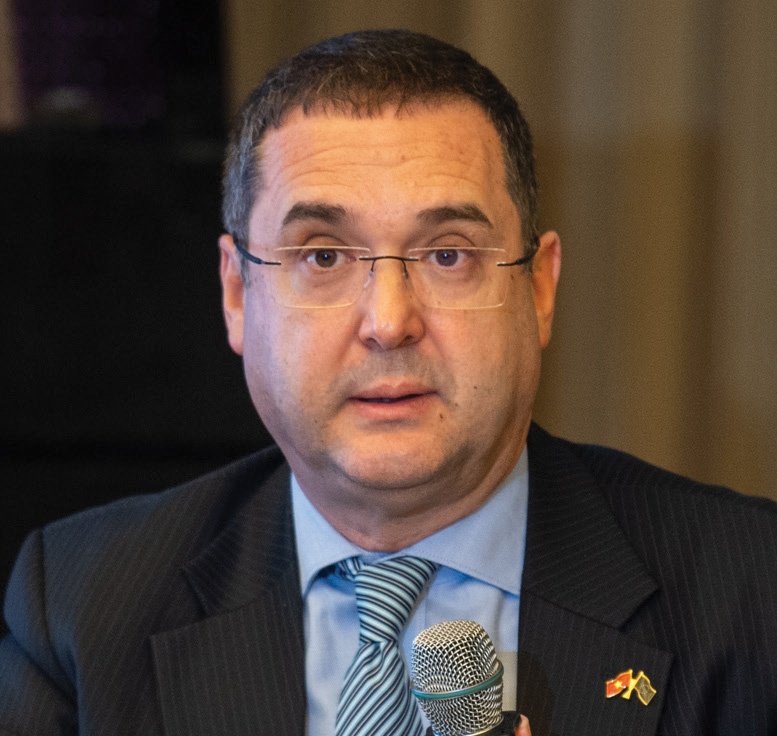Vietnam’s dedicated path to net-zero emissions
 |
| Rui Ludovino, first counsellor of Climate Action, Environment, Employment, and Social Policies at the Delegation of the EU to Vietnam |
What is the current status of the EU’s cooperation with Vietnam?
It is inevitable that Vietnam must implement a circular economy to achieve the goal of green growth and net zero emissions. Part of the European Green Deal is related to the circular economy. However, the circular economy is associated with the way in which production and consumption are transformed, which has a great impact on the use of natural resources. In this matter, we will work together.
We are currently discussing with partners, including Vietnam, how to develop transformation policies and mechanisms to promote innovation in industries.
The EU is interested in the impact of the textile and footwear industries on the environment and people in Vietnam. European consumers want to import clean, environmentally friendly products. They do not buy products whose production process negatively affects workers and pollutes water and land.
How prepared is Vietnam for the transition to a greener economy?
The EU is investing heavily in building a circular, low-carbon, and resource-efficient economy. We approach the circular economy with a focus on preventing and reducing waste, reusing and recycling products and materials to get the most out of the raw materials and waste, thereby helping to save energy and funds.
Vietnam is currently one of the countries with great economic growth, with a growth rate of 6-7 per cent per year and significant export turnover. However, increased production means more resource consumption, especially energy.
The world is looking for alternative sources of raw materials of the same quality but at a lower cost. Currently, waste is one of the main alternatives. If in the coming years, Vietnam manages and controls waste better, the amount of domestic waste will be a huge economic opportunity.
How would you evaluate Vietnam’s recent steps towards green growth?
It’s most important that Vietnam has shown its determination to the world, and political decisions have also been made to implement the Green Growth Strategy in the spirit of the Paris Agreement.
The government is making efforts to develop programmes and activities related to the national strategy on climate change adaptation. Vietnam has also set specific emission reduction targets and revised the draft of the Power Development Plan VIII.
How is the financial mobilisation for the implementation of the green deal organised by the EU?
In 2009, the UN launched the Global Green New Deal, and 10 years later the EU launched its green deal. In order to realise the goals of the green deal, the EU needs huge financial resources, partly from Europe itself, partly contributed by stakeholders. The EU budget is contributed by member states, deducting 1 per cent from VAT, which will be used for policy-making and more.
The budget has been spent to serve the development of new policy in line with the objectives of the green deal. These policies will support stakeholder engagement more actively. Meanwhile, industries must innovate and invest to make this deal happen. For example, through investments in research and development and innovative activities to serve the goal.
How the EU has mobilised the private sector?
We have changed and created an open business environment for businesses through revised legal regulations and incentives.
We clearly define clean energy activities and the green economy, thus helping businesses identify investment activities and access profitable loans. Businesses will invest when there is a favourable investment environment.
In fact, no budget source can afford to invest huge financial sums to green the economy. Like the European Union, Vietnam must create a strong environment and come up with appropriate policies and mechanisms to attract financial resources from domestic and foreign private sources. Vietnam is slowly gaining more large enterprises which should also be invited to participate in this work.
What the stars mean:
★ Poor ★ ★ Promising ★★★ Good ★★★★ Very good ★★★★★ Exceptional
Related Contents
Latest News
More News
- Bac Ai Pumped Storage Hydropower Plant to enter peak construction phase (January 27, 2026 | 08:00)
- ASEAN could scale up sustainable aviation fuel by 2050 (January 24, 2026 | 10:19)
- 64,000 hectares of sea allocated for offshore wind surveys (January 22, 2026 | 20:23)
- EVN secures financing for Quang Trach II LNG power plant (January 17, 2026 | 15:55)
- PC1 teams up with DENZAI on regional wind projects (January 16, 2026 | 21:18)
- Innovation and ESG practices drive green transition in the digital era (January 16, 2026 | 16:51)
- Bac Ai hydropower works stay on track despite holiday period (January 16, 2026 | 16:19)
- Fugro extends MoU with PTSC G&S to support offshore wind growth (January 14, 2026 | 15:59)
- Pacifico Energy starts commercial operations at Sunpro Wind Farm in Mekong Delta (January 12, 2026 | 14:01)
- Honda launches electric two-wheeler, expands charging infrastructure (January 12, 2026 | 14:00)

 Tag:
Tag:




















 Mobile Version
Mobile Version